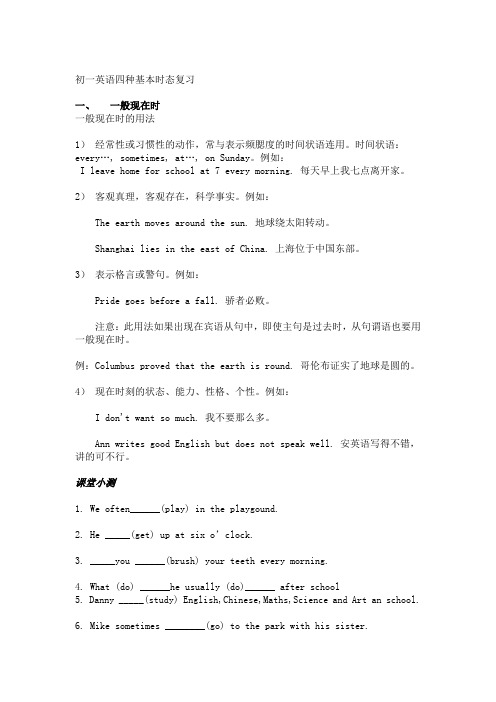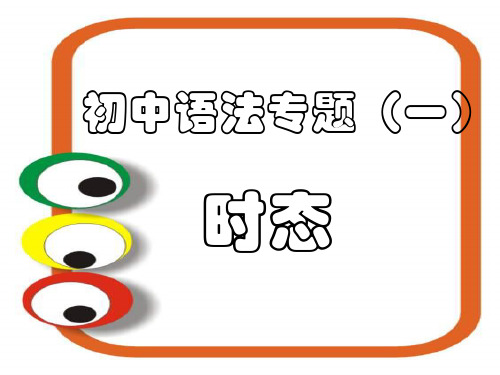初一英语时态专题复习 7.11
新版外研社七年级英语三种时态复习要点及巩固练习.doc

七年级三种时态复习要点及巩固练习一般现在时(一) 定义:1)表示现在的状态;2)表示经常或惯的动作;3)表示主语县备的性格爱好或能力.例如:My backpack is on the sofa.He plays soccer ball every day. My sister gets up at 6:00. My mother likes strawberries. She knows English.(二) 标忠性时间状语:always, usually, often, sometimes, every week (day, year, month."),once a week, on Sundays, etc.(三) 一般现在时的构成:当谓语动词为be 动词时: 主语+be (am/is/are) +其它. 当谓语动词为行为动词时:主语+动词原形/V-s/V-es+其它(四) 一般现在时的基木结构:1. 当谓语动词为be 动词时:主语+ be (am/is/are) +其它. 肯定句:主语+ be (am/is/are) +其他否定句:主语 + be (am/is/are) +not+其他.(isn’t/aren’t) 一般疑问句:Be (Am / Is /Are) +主语+其他+?特殊疑问句:特殊錠问词+ be (am /is / are) +主语+其他+? 2. 当谓语动词为行为动词时:主语是第三人称单数时:主语+动词的第三人称单数+其他He likes the apples主语+doesn’ t+动词原形+其他 Does+主语+动词原形+其他+? Yes,主语+does. No,主语+doesn’ t. 特殊疑问词+—般疑问句+? 3. 当谓语动词为行为动词时:主语不是第三人称单数时: 主语+动词原形+其他 主语+don’ t+动词原形+其他 Do+主语+动词原形+其他+? Yes,主语+do. No,主语+don’ t. 待殊疑问词+—般疑问句+?(五) 动词的第三人称单数形式的变化规则(请用心记住新目标英语七年级教材 上册PP97-98表格内容)第三人称单数作主语时,谓语动词用单数,其变 化规则有: 1. 一般情况,在动词词尾加s;2. 以字母s, x ,ch ,sh ,o 结尾的动词,加es;3. 以e 结尾的动词,加s;肯定句: 否定句: 一般疑问句 肯定回答: 否定回答: 特殊疑问句 He doesn ,t like the apples. Does he like the apples? Yes, he does.No, he doesn ,t.What does he like?肯定句: 否定句: 一般疑问勾 肯定冋答: 否定回答: 特殊疑问句 i have a pen.I dor? t have a pen. Do you have a pen? Yes, T do. No ,I don’t. What do you have ?4.以辅音字母加y结尾的动词,先变y为i,再加es5.以元音字母加y结尾的动词,加s;6. 特殊:have+has are+is现在进行时(一)定义:表示现在(说话瞬间)正在进行或发生的动作,也可表示当前一 段时间内的活动或现阶段正在进行(二) 标忠性时间状语:now, listen! look! at this time, these days, etc. (三) 构成:主语+助动词be ( am/is / are /) +动词-ing (现在分词)形式+其它。
人教版七年级英语下册一般现在时态、现在进行时态、一般过去时态三种时态 综合讲解 (共20张PPT)

buy can -
bought
went
had knew learnt made
could
sit takethinkwill tell -
come- came do eat fall find did ate fell
make meet read run say -
would
told
met
read ran said
③以“辅音+y “结尾变y 为i再加-es.
①直接加-ed. 过去式的构成: ②以e结尾只加d. ③重读辅元辅,双写尾字母再加-ed. ④以“辅音+y”结尾变y 为i 再加-ed.
现在分词 have - having look - looking begin- beginning useusing
先(一般疑问句) 再(否定句)
句 型 变 化 操 练
He isn’t a teacher. 2. Kangkang comes from China. Does Kangkang come from China? Kangkang doesn’t come from China.
3.
I usually take the bus to work. Do you usually take the bus to work?
last night
now every day
一般现在时
Look!
yesterday often Listen! two years ago
一般过去时
always
in 1897 three times a week
现在进行时
判断时态形式:
1. 2. 3. 4. 5. 6. 7. He always likes playing the piano.(
(最新整理)人教版七年级英语下册综合复习课件:时态(共29张PPT)

3. My mother _w__a_t_c_h_e_s_(watch) TV play every day. 4. Old Bush _v_i_s_i_te_d__(visit) China again last month.
5. I __p_l_a_y_ (play) sports three times a day.
一(般Th过e Si去mp时le :过去某个时间或时间段发 Past Tense) 生的动作或存在的状态。
2021/7/26
3
一般现在时:Present Simple
表示经常或者反复发生的动作
信息词:
often(经常) always(总是) every day(每天) every month(每月)
(最新整理)人教版七年级英语下册综合复习课件:时态(共29张PPT)
2021/7/26
1
2021/7/26
2
现在进行时:
(Theous Tense)
时 态
一般现在时:经常或习惯性的动作或
(The Simple 存在的状态。
Present Tense)
6. Look! Lucy and Lily _a_r_e__r_e_a_d_i_n_g_(read) books. 7. There __w__a_s__(is) a football match yesterday afternoon.
8. Our class _w__e_n_t_( go) to the zoo three days ago.
We go to school every day.
2、下课后我们打扫教室。
We clean the classroom after class.
初一英语四种基本时态

初一英语四种基本时态复习一、一般现在时一般现在时的用法1)经常性或习惯性的动作,常与表示频腮度的时间状语连用。
时间状语:every…, sometimes, at…, on Sunda y。
例如:I leave home for school at 7 every morning. 每天早上我七点离开家。
2)客观真理,客观存在,科学事实。
例如:The earth moves around the sun. 地球绕太阳转动。
Shanghai lies in the east of China. 上海位于中国东部。
3)表示格言或警句。
例如:Pride goes before a fall. 骄者必败。
注意:此用法如果出现在宾语从句中,即使主句是过去时,从句谓语也要用一般现在时。
例:Columbus proved that the earth is round. 哥伦布证实了地球是圆的。
4)现在时刻的状态、能力、性格、个性。
例如:I don't want so much. 我不要那么多。
Ann writes good English but does not speak well. 安英语写得不错,讲的可不行。
课堂小测1. We often______(play) in the playgound.2. He _____(get) up at six o’clock.3. _____you ______(brush) your teeth every morning.4. What (do) ______he usually (do)______ after school5. Danny _____(study) English,Chinese,Maths,Science and Art an school.6. Mike sometimes ________(go) to the park with his sister.7. At eight at night, she __________(watch) TV with his parents.8. ________ Mike________(read) English every day9. How many lessons_________your classmate________(have) on Monday10. What time_________his mother_________(do) the housework改句子1. Do you often play football after school (肯定回答)2. Gao Shan’s sister likes playing table tennis (改为否定句)3. She lives in a small town near New York. (改为一般疑问句)4. We have four lessons.(否定句)5. Nancy doesn’t run fast (肯定句)6. Mike has two letters for him.一般疑问句:否定句:7. I usually play football on Friday afternoon.否定句:一般疑问句:划线提问8. Tom does his homework at home.否定句:一般疑问句:划线提问二、一般过去时一般过去时的基本用法:1.通常表示过去发生的而现在已经结束的事件、动作或情况。
初一英语时态

初一英语时态(共5页)--本页仅作为文档封面,使用时请直接删除即可----内页可以根据需求调整合适字体及大小--初一英语一般现在时态讲解一、定义与讲解一般现在时表示经常或习惯性的动作或一般性事实。
,也可表示现在的状态或主语具备的性格和能力。
通常与副词every day(每天),always(总是),usually(通常),often(经常)sometimes(有时),等时间状语连用。
例:(1)表示事物或人物的特征、状态。
The sky is blue.天空是蓝色的。
Mary’s father is a n English teacher. 玛丽的爸爸是一名英语老师。
(2)表示经常性或习惯性的动作。
I get up at six every day.我每天六点起床。
She plays sports every day. 她每天都做运动。
(3)表示客观现实。
The table has four legs.桌子有四条腿。
There are 50 students in my class. 我们班有50个学生。
(4)表示客观真理,科学原理,自然现象,等客观事实或格言谚语等。
The sun rises in the east every day.太阳每天从东方升起。
The earth goes around the sun.地球绕着太阳转。
(5)表示平日的喜好。
I like bananas. We don’t like vegetables.He likes ice cream. She doesn’t like strawberries.二.只有主语在第三人称单数时用动词的“三单形式”,其他人称用动词原形。
★动词三单形式的变化规则:1.(1)多数直接在动词词尾加-s.play — plays like — likesask---asks work---works get---gets call---calls(2)以字母s, x, ch, sh或o结尾的动词,在词尾直接加-es.watch---watches wish---wishes do---does go---goes(3)以“辅音字母加 - y”结尾的动词,要先变y为i再加-es.try---tries study---studies cry---cries fly---flies2.不规则变化:be---- is have----has三、一般现在时的句子转换:(1)变一般疑问句:当句子中有be动词或情态动词时,则把be动词或情态动词(can,could等)提到主语的前面,(口诀:一调二变三问号);(2)变否定句:在be动词或情态动词后面直接加not变成否定句. (be后not莫忘记)例:①陈述句:She is my sister..疑问句→ Is she your sister Yes, I am./ No, I’m not.否定句→ She is not my sister.2②陈述句:I can play soccer.疑问句→ Can you play soccerYes,Ican./ No, I can’t.否定句→ I can not /can’t play soccer.★注意:对一般疑问句的回答:一般用什么问就用什么来回答。
初中英语时态讲解及练习-(全)(共62张PPT)

6. 用法:现在进行时表示
1)、现在(说话的瞬间)正在 进行或发生的动作,强调 “此时此刻”。
e.g. he is reading . they are tal now. 2)、当前一段时间内的活动或 现阶段正在进行的动作。 e.g. they are wor these days.
现在分词的变法有
结尾是e的动词在末尾加-d
like→liked live→有一个辅音字母的重读 plan→planned
闭音节,先双写这个辅音字母,stop→stopped
再加-ed
drop→dropped
结尾是“辅音字母+y”的动词,study→studied
先变“y”为“i”再加-ed
初中语法专题(一)
时态
一般现在时 一般过去时 现在进行时 过去进行时 现在完成时 过去完成时 一般将来时 过去将来时
一般现在时
一、一般现在时:
概念:经常、反复发生的动作或行为及现在的 某种状况。 时间状语: always, usually, often, sometimes, every week (day, year, month…), once a week, on Sundays, etc. 基本结构:①be动词;②行为动词 否定形式:①am/is/are+not;②此时态的谓语动 词若为行为动词,则在其前加don't,如主语为第 三人称单数,则用doesn't,同时还原行为动词。 一般疑问句:①把be动词放于句首;②用助动 词do提问,如主语为第三人称单数,则用does, 同时,还原行为动词。
一般将来时
构成:①will,shall+动词原形,其中shall只用 于第一人称。②be going to +动词原形,表 示主观打算,按计划,安排要发生的事情。 ③be to +动词原形,表示客观安排 ④ be about to +不定式,意为马上要做某事,正 要做某事。⑤某些动词,可用进行时态表 将来,如come, go, arrive, leave。⑥在时间 状语从句和条件状语从句中,主句用一般 将来时(will+动词原形),从句中用一般现 在时表将来。⑦一般现在时可表示按时间 表发生的将来的动作(限start, begin, arrive, end, close, leave---等表示开始或移动意义的 词)
初中英语人教版七年级下册新目标英语七年级下册动词的时态专项复习教案
新目标英语七年级下册动词的时态专项复习教案教学目标:知识目标1) 掌握动词的原形、第三人称单数、过去式及动名词形式2) 掌握一般现在时、现在进行时、一般将来时和一般过去时四种基本时态的概念、结构及基本用法能力目标通过在练习中比较学习,学会如何分析句子的时态并能正确运用基本时态解答单项选择题型。
重点和难点教学重点:一般现在时、现在进行时、一般将来时和一般过去时四种基本时态的概念、结构及基本用法;教学难点:如何正确区别这四种基本时态。
情感态度价值目标:在学习过程中培养学生克服困难的决心和勇气,培养互助互学的美德,增进同学间的友谊。
教学手法:多媒体教学教具准备班班通投影机.教学过程:step1 : reviewing时态是英语学习中一个至关重要的内容,广大初中学生在实际运用时,往往对时态总是倍感棘手,下面我们就归纳复习一下這几种时态。
step2: 时态语法一、一般现在时:概念:经常、反复发生的动作或行为及现在的某种状况。
时间状语:always, usually, often, sometimes, every week (day, year, month…), once a week, on sundays, etc.基本结构:①be动词;②行为动词否定形式:①am/is/are+not;②此时态的谓语动词若为行为动词,则在其前加don't,如主语为第三人称单数,则用doesn't,同时还原行为动词。
一般疑问句:①把be动词放于句首;②用助动词do提问,如主语为第三人称单数,则用does,同时,还原行为动词。
课堂练习题。
1. He______(be, am, is, are) a teacher at No. 2 Middle School.2. He______(have, has) classes in the afternoon.3. He______(get, gets) up at half past six every morning.4. He always _____(come, comes ) to school on time.5. He ______(study, studies) very hard at his lesson.6. One and two _____(be, is, are) three.7. Blue and yellow _____(make, makes) green.8. The earth _____(move, moves) round the sun.9. I will go there if I ____( be, will be, am, is, are) free tomorrow.10. I will go there when I ____(have, will have, has) time tomorrow.11. He won’t come to the party unless he _____(be, will be, am, is, are) invited.12. I’ll wait here until my mother ____(come, comes, will come) back.13. Please return the book to the library as soon as you ______(finish, finishes, will finish) reading it.14. Once you _____(see, sees, will see) him, you will never forget him.二、现在进行时:概念:表示现阶段或说话时正在进行的动作及行为。
初一英语时态复习
初一英语时态复习一、用所给动词适当形式填空:1、Let's ___ (read) the text again・2、Listen, who __ (play) the piano?3、Be quiet, they __ (have) a meeting now・4^ Where ____ (be) Miss Sun? She ___ (help) her students with their English.5、____ Anna ___ (like) English? Yes, she ____ (speak) English very well.6、Look, they ___ (come) out of the swimming pool.7、____ you ____ (swim) yesterday?8、There ____ (be) a pen and some books on the desk last night・9、she ______ (sit) there a minutes ago.10、_____________ They (play) soccer with Class 4 last week・11、________________________ The students of Class One (go) to Qingdao last weekend・12、______________________ S ometimes Zhao Fang (watch) TV after school.13、________ Father _________ (cook). Lefs _ (go) and (help) him.14、______ We (visit) our grandpa yesterday morning・15、___ ____________________________ (close) the window, please・ It (rain) now.16、________ M ary (have) lunch at school everyday・17、________ W hy (be)Jim often late for school.18、___________ A: Who ____________________ (like) dancing? B: Jane (do).19、______ A: ______ they(enjoy) the Great Wall yesterday? B: Yes, they ______________________ (do).20、________________________ How many words can you (read) in one minute.21、The students of Class Fine __ (clean) their classroom every Friday.It _____ (be) Friday today・ they __ (clean) their classroom now.22、_________________ Our class teacher (give) us a talk yesterday morning..23、_____________ Miss Li can(draw) well・24、________ D oif t (open) the window.25、____________________ Be carefill! The bus _________ (come). Lett get ready for (get) on it.26、___________ My sister (do) some washing now.27、________ T hey (have) a meeting yesterday afternoon.28、________ T hey (not have) any lessons at the weekend・29、_________________ she enjoyed (listen) to Pop music.30、____________________ My father always(finish) his work at 11:00 p.m., then he _____________________________ (go) home in his car.31、T hese boys ____ (not listen) to the English programme very every evening・32、S he ________ (tell) us a story last weekend・33、W hat ________ h e usually _________ (do) after school?34、A: What ______ Tim _________ (do) in his room?B: He _____________ (go) over his lessons.35、________ (not speak) loudly(大声地).The baby ________ (sleep)・36、H appy birthday to you, Mary・ Here ____ (be) some presents for you・37、E very student must ______ (keep) quiet in the reading room・38、H e likes ______ (dance), now he _________ for us.39、A: Who likes _______ (watch) TV?B: I ____ (do).40、I______ (not know) how to _______ (go) there・41、Let's go and ____ (draw) a picture・42 > The mother is watching her son _____________ (play) with the cat.・43、O ften it ___________ (not rain) in winter here, but today it a _______ (rain) day.44、I n the afternoon, my grandma usually ______ (read) books・45、_______ (look) at the blackboard, please・46、______ he _________ (have) a meeting last Saturday?47、_______ you _______ (visit) your teacher every year?48、F d like _______ (boiTOw) some books・49、H e often ______ (have) a meeting on Friday.50、_______ (not waste) time・51、M ary _______ (be) ten years old. I ______ (want) ___ (buy) a present for her.52、T he students of Class Five ______ (have) a picnic last Saturday.53、C lass begins, please stop __________ (talk). Please stop __________ (take)out books・54、N ow they _______ (visit) their school. They _______ (come) to our school yesterday..55、I want _______ (buy) a book this Sunday・12、A: May I use your pen?B: Yes, you _____ .。
初一重要动词时态总结与练习
初一重要动词时态总结与练习一、时态总结初中英语中,动词时态是一个重要的语法知识点。
掌握不同的时态对于正确表达过去、现在和将来的事件非常关键。
以下是初一学生经常用到的几种时态和其用法总结:1. 现在简单时态(Simple Present):用于描述经常性或普遍性的行为、现状或观点。
例如:I play soccer every weekend.(我每个周末都踢足球。
)2. 过去简单时态(Simple Past):用于表示过去发生的事情。
例如:I watched a movie yesterday.(昨天我看了一部电影。
)3. 将来简单时态(Simple Future):用于表示将来发生的事情。
例如:She will visit her grandparents next month.(下个月她将会去看望她的祖父母。
)4. 现在进行时态(Present Continuous):用于表示现在正在进行的动作。
例如:They are playing basketball in the park.(他们正在公园里打篮球。
)5. 过去进行时态(Past Continuous):用于表示过去某个时间正在进行的动作。
例如:He was studying English when I called him.(我给他打电话的时候,他正在学习英语。
)6. 将来进行时态(Future Continuous):用于表示将来某个时间正在进行的动作。
例如:I will be sleeping when you arrive.(你到达时我将正好在睡觉。
)7. 现在完成时态(Present Perfect):用于表示过去发生的动作对现在造成的影响。
例如:She has already finished her homework.(她已经做完作业了。
)8. 过去完成时态(Past Perfect):用于表示过去某个时间或事件之前发生的动作。
人教版七年级英语时态总结
人教版七年级英语时态总结人教版七年级英语时态总结如下:1、一般现在时(1)构成:主语+be动词(am/is/are)+其他。
(2)用法:表示现在经常发生的动作或存在的状态。
例句:He is a student. 他是一个学生。
2、现在进行时(1)构成:主语+be动词(am/is/are)+动词-ing形式。
(2)用法:表示现在正在进行的动作或存在的状态。
例句:He is listening to the music now.他现在正在听音乐。
3、现在完成时(1)构成:主语+have/has+动词的过去分词。
(2)用法:表示过去发生的动作对现在造成的影响或结果。
例句:I bought a new house, but I haven't sold my old one yet, so at the moment I have two houses.我买了一所新房子,但是还没有卖掉旧的,所以现在我又两所房子。
4、现在完成进行时(1)构成:主语+have/has+been+动词的ing形式。
(2)用法:表示从过去某一时刻开始一直延续到现在的动作或状态,强调这个动作可能会继续下去。
例句:We have been working on this project for over a month now.到目前为止,我们一直在处理那个项目,已经花了一个多月时间了。
5、一般过去时(1)构成:主语+动词的过去式。
(2)用法:表示过去某个时间发生的动作或存在的状态。
例句:I bought some fruits yesterday.我昨天买了一些水果。
6、过去进行时(1)构成:主语+was/were+动词-ing形式。
(2)用法:表示过去某个时间正在进行的动作或存在的状态。
例句:I was travelling in London last summer vacation.去年暑假我在伦敦旅行。
7、过去完成时(1)构成:主语+had+动词的过去分词。
- 1、下载文档前请自行甄别文档内容的完整性,平台不提供额外的编辑、内容补充、找答案等附加服务。
- 2、"仅部分预览"的文档,不可在线预览部分如存在完整性等问题,可反馈申请退款(可完整预览的文档不适用该条件!)。
- 3、如文档侵犯您的权益,请联系客服反馈,我们会尽快为您处理(人工客服工作时间:9:00-18:30)。
初一英语时态专题复习 一、 一般现在时:(1、现在的状态。2、经常或习惯性动作。3、主语所具备的性格和能力。4、真理。) 1、标志:often(经常),usually(通常),sometimes(有时),always(总是),never(从不), on Sundays(在星期天), every day/month/year(每一天/月/年) 2、结构: (1)主语+连系动词be(am/is/are)+名词/形容词/数词/介词短语/副词等做表语表状态(包括There be +n.)
练习:1.I______(be) a student. My name_____(be) Tom. 2. Where _____(be) my shoes? They___(be) here. 3.Who ____(be) the girl with long straight hair? I think she ___(be) Kate. 4. You and I ___(not be) in Class Six. 5.___(be) there a supermarket on the Fifth Avenue? Yes, there_____(be). 6. ____ her parent tall? No, he____.
(2)主语(非第三人称单数)+行为动词原形+其他 (用助动词do 帮助构成否定句、一般疑问句和特殊疑问) (3)主语(第三人称单数)+行为动词的第三人称单数+其他(用助动词does 帮助构成否定句、一般疑问句和特殊疑问句) 行为动词第三人称单数加-s的形式1.- s 2. 辅音+y: study-studies 3.以s,x,ch,sh结尾watch-watches teach-teaches4特殊have-has do-does go-goes
.1)His parents _______(watch) TV every night. 肯定句 1) My brother _________(do) homework every day. 2)His parents _________(not watch) every night.否定句 2)My brother________(not do)homework every day. 3)_____his parents_____(watch) TV every night?一般疑 3)______ your brother _____ homework every day? Yes, they _______. No, they _______. Yes, he______. No, he _________. 4)When___ his parents _____(watch) TV? 特疑 4)When _____ your brother ____(do) homework? They watch TV every night. He does homework every day.
二. 现在进行时:表示说话瞬间或现阶段正在进行的动作。 1、 标志: now(现在)listen(看)look(听) 2、 结构:主语+助动词be(am/is/are)+行为动词的现在分词(doing) 现在分词的构成:1.-ing: eat-eating 2.辅音字母+e: take-taking 3. sit, put, begin, run, swim, stop, get, shop,(双写最后一个辅音字母,再加ing.) 练习:1. Jim __________________(take) photos in the park now.
2. Jim_________(not take) in the park now. 3. _______________Jim____________(take) photos in the park now? Yes, he _____. No, he _______.
4. Where _________Jim ____________ photos now? In the park.
三、情态动词:1、任何主语+can/may/must+动词原形 2、主语+ can’t/may not/ mustn’t+动词原形 3、 Can/May/Must + 主语+ 动词原形? 4、疑问词+can/may/must+主语+动词原形?
四、非谓语动词(是固定搭配) 1. like+ to do不定式/doing动名词 2.want to do sth. 3. love to do 4. would like to do sth. 5. enjoy doing sth. 6. thanks for doing 7. stop doing sth 8. let sb. do sth. She wants _____(have) a party. Does he like _______(swim)? Thanks for _______(enjoy) CCTV show. She never stops ____(talk). 五.祈使句: Go straight and turn left/ right. Go through Fifth Avenue. Take a taxi(Take a bus,Take a walk……)
六.综合练习:1.Mr Green _____(be) a worker. Now he ____(work) in the field. 2.Listen! Who_______(sing)? 3.What time ____ your brother usually _____(do) his homework? 4.You can_______(come) here by bus. 5. Who ____(have) a ruler? 6.Are they_____(clean) the room? 7.-____ you____(eat) dinner? – Yes, we are. 8.Jack ____(have) a soccer ball, but he ____(not have) a basketball. 9._______Jim _______(like)______(run)? 10.They _____(be) from Canada. They______(not speak) Chinese. 11. He wants _________________(be) tall.
1.我们正在吃晚餐。 2、我们每天6点起床。 We __________________________. We __________________ at six every day.
3.你们在聊天吗?是的。 4、他们常常聊天吗?不是。 _______ they _______? Yes, they _____. ______ they often ______ ? No, they ________. 5、他在做什么?他在做作业。 6、他晚上常干什么?他常做作业。 What ____he ___? He_______. What ___he usually ___ in the evening? He usually______.
七.人称代词: 我 你 他 她 它 我们 你们 他/她/它们 主格: I you he she it we you they 宾格: me you him her it us you them 形容词性物主代词: 我的 你的 他的 她的 它的 我们的 你们的 他/她/它们的 my your his her its our your their 练习:1.____I____(我) am a worker. _____You____(你) are a doctor. ___She___(她) is a teacher.
2.This is (他的 )shirt. 3. This is _____my_____(我的)pen. 4.____Their_____(他们的) trousers are there. 5. I like this picture. Please give ____it____(它) to _____me___(我). 6. People get ____their____(他们的) money from _____me____(我). 7.___They__(他们) are new students. ___Their__(他们的) names are Lucy and Lily.
8. These are ___our__(我们的) shoes. Can __we__(我们) wear ___them___(它们).
9.Thank _______ for ____your___(你的) help.
10. ____He___(他) loves ____her___(她), and ___she____(她) loves ____him___(他),too. ____I___(我) love _____you____(你), and ____you____(你) love ____me___(我),too.
八,There be句型 句型转换 1)There is a bank on the street. 2) There are some cars in front of the park. 否定句:There _______a bank on the street.
否定句:There ______ _______cars in front of the bank. 一般疑问句:_______ ______ a bank on the street? 一般疑问句:____ ______ ______cars in front of the bank? 就划线部分提问:________ on the street? 就划线部分提问:_____ _____ in front of the bank? There’s a bank on the street. There are some cars in front of the bank. 同上:____ ______ ______are there on the street? 同上:____ ____ ____ are there in front of the bank There’s only one. There’re some. 2)将下列句子改为否定句、一般疑问句 1. We are eating lunch. We eat lunch at noon.
